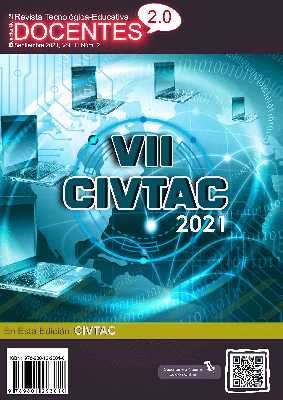University Social Responsibility in Technology Mediated Education in the Context of the COVID-19 Pandemic
 DOI:
https://doi.org/10.37843/rted.v11i2.247
DOI:
https://doi.org/10.37843/rted.v11i2.247
Main Article Content
Abstract
The university is a community of interests where educational processes are their core emerging actions within their institutional dynamics. The technification of the educational process has been going on for more than a decade, but it has had a dizzying growth in the last two years due to the CODIV-19 pandemic. Therefore, the research objective was to interpret the experiences of professors from the Yacambú University on university social responsibility (USR) in education mediated by technologies associated with the COVID-19 pandemic. In this sense, this carried research was out under a qualitative approach of an interpretive paradigm. The epistemological plane was assumed from social constructionism to understand the meanings that emerged from the dialogical exchange between the researcher and key informants, all with the support of the phenomenological-hermeneutical method. The sample is based on the archiving of opinions of 4 professors assigned to the Faculty of Humanities of the Yacambú University with functions of teaching, research, extension, management. As a finding of this research, it was obtained that universities are institutions of great relevance for the social development of a nation since they respond to the needs of populations, attending to emerging problems resulting from an investigative activity, thus managing to vindicate their role of social responsibility. Likewise, it was concluded to determine the importance of the technological aspect for a consolidation of the teacher and student in their current context.
Downloads
Metrics
Article Details

This work is licensed under a Creative Commons Attribution-NonCommercial-NoDerivatives 4.0 International License.
Those authors who have publications in our journal accept the following terms:
- When a work is accepted for publication, the author retains rights of reproduction, distribution of his/her article for exploitation in all countries of the world in the format provided by our magazine and any other magnetic medium, optical, and digital.
- Authors will retain their copyright and guarantee the journal the right first to publish their work, which will be simultaneously subject to the Creative Commons Acknowledgment License (Attribution-NonCommercial-NoDerivatives 4.0 International (CC BY-NC-ND 4.0)). That allows third parties to copy and redistribute the material in any medium or format, under the following conditions: Acknowledgment - You must properly acknowledge authorship, provide a link to the license, and indicate if any changes have been made. You may do so in any reasonable way, but not in a way that suggests you have the licensor's endorsement or receive it for your use. NonCommercial - You may not use the material for a commercial purpose. NoDerivatives - If you remix, transform, or build from the material, you cannot broadcast the modified material. There are no additional restrictions - You cannot apply legal terms or technological measures that legally restrict you from doing what the license allows.
- Authors may adopt other non-exclusive license agreements to distribute the published version of the work (e.g., deposit it in an institutional archive or publish it in a monographic volume) provided that the initial publication in this journal is indicated.
- Authors are allowed and recommended to disseminate their work through the Internet (e.g., in institutional telematic archives, repositories, libraries, or their website), producing exciting exchanges and increasing the published work's citations.
- Request of withdrawal an article has to be done in writing by the author to the Editor, becoming effective after a written response from the Editor. For this purpose, the author or authors will send correspondence via e-mail: [email protected].
- The author will not receive financial compensation for the publication of his work.
- All Docentes 2.0 Journal publications are under the Open Journal System (OJS) platform at: https://ojs.docentes20.com/.
References
Baca, H. (2015). La responsabilidad social universitaria: propuesta conceptual y medición en el ámbito de una Universidad Privada de Lima – Perú. [Tesis Doctoral, Universidad de Sevilla]. https://idus.us.es/handle/11441/38435
CEPAL-Unesco. (2020). La educación en tiempos de la pandemia de COVID-19. Digital Repository Economic Commission for Latin America and the Caribbean https://repositorio.cepal.org/bitstream/handle/11362/45904/1/S2000510_es.pdf
Constitución de la República Bolivariana de Venezuela. (1999). Gaceta Oficial de la República Bolivariana de Venezuela, N° 36.860 (Extraordinaria), Diciembre 30, 1999.
García, L. (2021). COVID-19 y educación a distancia digital: preconfinamiento, confinamiento y posconfinamiento. Revista Iberoamericana de Educación a Distancia, 24 (1), 9-25. https://www.redalyc.org/jatsRepo/3314/331464460001/331464460001.pdf DOI: https://doi.org/10.5944/ried.24.1.28080
Goyo, A., Figueredo, C., Méndez, E., Chirinos, E. y Rivero, E. (2012). La gerencia de la educación universitaria, en la perspectiva de la transcomplejidad. Revista Científica Ciencias Humanas, 8 (23), 109-131. http://www.redalyc.org/pdf/709/70925416004
Hernández, N. (2014). Teoría de la gestión del conocimiento. Gestiopolis. https://www.gestiopolis.com/teoria-de-la-gestion-del-conocimiento/
Martínez, M. (1991). La investigación cualitativa etnográfica en educación: Manual teórico – práctico. Venezuela.
Martínez, M. (2006). Ciencia y arte en la metodología cualitativa. Trillas.
Muñoz, C. (2012). Responsabilidad Social Universitaria: Aportes al enriquecimiento del concepto desde la dimensión de las prácticas. Instituto Universitario de Desarrollo y Cooperación – Universidad Complutense de Madrid. https://www.ucm.es/data/cont/docs/599-2013-11-16-Doc_23.pdf
Núñez, C., Gaviria-Serrano, J., Tobón, S., Guzmán-Calderón, C. & Herrera, S. (2019). La práctica docente mediada por TIC: una construcción de significados. Espacios, 40(5), 1-15. http://w.revistaespacios.com/a19v40n05/a19v40n05p04.pdf
Okuda, M. & Gómez-Restrepo, C. (2005). Métodos en investigación cualitativa: triangulación. Revista Colombiana de Psiquiatría, 34(1), 118-124. http://www.scielo.org.co/scielo.php?script=sci_arttext&pid=S0034-74502005000100008
Orellana, G. (2015). La praxis pedagógica del docente de biología del Instituto Pedagógico de Barquisimeto (IPB). Educere, 19(62), 91-99. Disponible: https://www.redalyc.org/pdf/356/35641005008.pdf
Pérez, G. (1994). Investigación cualitativa: retos e interrogantes. Muralla.
Rivero, E. & Goyo, A. (2012). La gerencia universitaria venezolana ante los nuevos retos de la sociedad del siglo XXI. Gestión y Gerencia, 6 (2), 4-25. http://www.ucla.edu.ve/DAC/investigacion/gyg/GyG%202012/Agosto%202012/1-%20EduardaRiveroyOtros.pdf
Vallaeys, V. (2007). Responsabilidad Social Universitaria. Propuesta para una definición madura y eficiente. Biblioteca Virtual en Responsabilidad Social y temas relacionados. http://www.bibliotecavirtualrs.com/wp-content/uploads/2011/12/Responsabilidad_Social_Universitaria_Francois_Vallaeys.pdf
Vallaeys, F. (2014). La responsabilidad social universitaria: un nuevo modelo universitario contra la mercantilización. Universia, 12(5), 105-117. http://www.scielo.org.mx/scielo.php?script=sci_arttext&pid=S2007-28722014000100006 DOI: https://doi.org/10.1016/S2007-2872(14)71945-6
Wigmore, A. (2016). La gestión de la Responsabilidad Social Universitaria (RSU). [Tesis Doctoral, Universidad de Córdova]. http://helvia.uco.es/bitstream/handle/10396/13365/2016000001394.pdf?sequence=1&isAllowed=y






